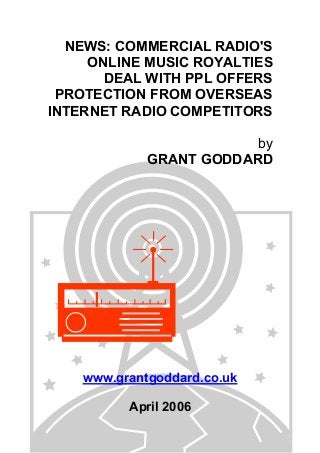More Related Content More from Grant Goddard (20) 1. NEWS: COMMERCIAL RADIO'S
ONLINE MUSIC ROYALTIES
DEAL WITH PPL OFFERS
PROTECTION FROM OVERSEAS
INTERNET RADIO COMPETITORS
by
GRANT GODDARD
www.grantgoddard.co.uk
April 2006
2. The implementation of measures to protect existing UK commercial radio
stations from online competitors could threaten the future of the fledgling
internet radio industry. On the same day last week that the Commercial Radio
Companies Association [CRCA] signed a new agreement with Phonographic
Performance Limited [PPL] that allows UK commercial radio stations to
continue using recorded music in their output from 1 April 2006, it emerged
that PPL will start contacting overseas internet radio stations to request
payments for a licence to allow them to be listened to in the UK.
Speaking at a seminar organised last week by industry organisation
MusicTank, PPL director of licensing Tony Clark explained: “The obligation for
overseas radio stations that stream into the UK goes back theoretically to
when they started. We have started conversations with the biggest streamers
to the UK to pay for the past and to pay going forward. We are going to start
with the biggest people. It’s always going to be difficult to police that. The
obligation for them to be licensed and pay is the same as any station based
here. We do act and we will certainly start with the biggest ones.”
Geoff Taylor, executive vice president of the International Federation of the
Phonograph Industries [the association of record companies], added: “We’ve
tried to make it easier [for internet stations] to get international licences. IFPI
has developed reciprocal licences between collection agencies. You have to
make it easy for people to get licences, and then those people who are not
prepared to pay will be closed down.”
A reciprocal clause included in the new PPL/CRCA contract requires that, from
1 April, UK commercial stations’ online simulcast streams must no longer be
made available to overseas listeners. Stations that still want to be heard in, for
example, the US will have to negotiate their own contract with the relevant
American royalty collection organisations.
Victoria Cooper of the CRCA explained: “Those [UK radio stations] who do not
wish to pay to be heard outside the UK will need to put measures in place to
ensure that their internet streams cannot be accessed by overseas listeners.”
Ian James, director of emerging channels at Chrysalis Radio, commented:
"This is a fundamental change in the way UK radio stations can work for
overseas listeners. Control of access by geographic regions is now an
essential part of online radio delivery."
Stations will be required to install geo-locking software on their streaming
audio servers that can identify the geographic location of a potential listener
from their Internet Protocol address before allowing them access to a radio
stream.
The new PPL contract provides existing UK commercial radio stations with
beneficial terms for simulcast streaming, based upon their stations’ net
broadcast revenues from both analogue and digital sources. This has raised
protests from independent UK-based internet-only stations, which are subject
to an entirely different pricing regime for their PPL licences.
News: Commercial Radio's Online Music Royalties Deal With PPL Offers Protection From Overseas Internet Radio
Competitors Page 2
©2006 Grant Goddard
3. News: Commercial Radio's Online Music Royalties Deal With PPL Offers Protection From Overseas Internet Radio
Competitors Page 3
©2006 Grant Goddard
The cost of the PPL Webcasting Licence is based not upon the revenues of a
particular internet station, which are still low in this nascent industry, but upon
the amount of listening the station receives, charged at a rate of 0.0503 pence
per song heard. As an example, even a small internet music station playing 14
songs per hour could easily attract 20,000 hours listened per month. This
would cost the station £162 per month (including an additional 15% PPL
premium levied for 'dubbing rights'), despite the fact that the station’s audio
streaming server costs could be less than £15 per month to achieve these
levels of listening.
On this basis, the PPL licence alone will cost an internet station £8 per 1,000
hours listened, whereas the UK commercial radio as a whole only achieves
£25 revenue per 1,000 hours listened, of which it pays about £2.50 in total to
PPL and the other royalty agencies PRS and MCPS for its use of music.
Internet station owners argue that the PPL terms offered to them will ruin their
business model, even without adding the additional royalties due to the other
two agencies, because revenues from internet radio are still only a fraction of
that achieved by analogue stations.
If the PPL and IFPI go ahead with their threat to prevent unlicensed foreign
internet stations from being heard in the UK, it would become the only country
other than China where citizens are prevented from accessing certain
overseas media sources.
[First published in 'The Radio Magazine' as 'Protectionism Threatens Internet Radio', #730, 5 April 2006]
Grant Goddard is a media analyst / radio specialist / radio consultant with thirty years of
experience in the broadcasting industry, having held senior management and consultancy
roles within the commercial media sector in the United Kingdom, Europe and Asia. Details at
http://www.grantgoddard.co.uk

